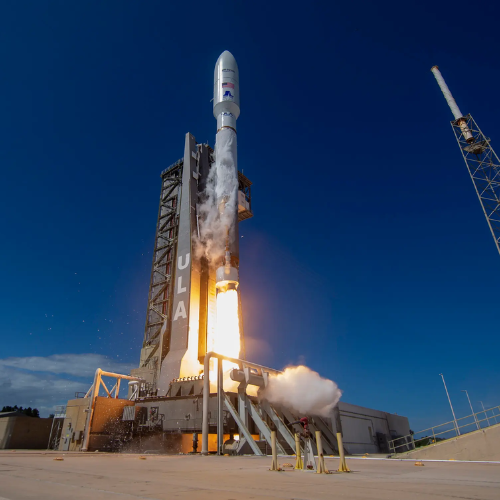Jeff Bezos is a name most people know. He’s the man who started Amazon in his garage nearly three decades ago. What began as an online bookstore became one of the biggest companies in the world. Today, Amazon sells almost everything you can think of.
After running Amazon for 27 years, Bezos stepped down from his job as CEO. But he didn’t slow down. Instead, he turned his focus to something much bigger—space. He now runs Blue Origin, a company that builds rockets and space technology. Recently, Blue Origin made headlines for planning a historic space mission with an all-female crew. Celebrities like Katy Perry, news anchor Gayle King, and Lauren Sánchez, who is Bezos’ partner, are part of this group. The mission will use the company’s New Shepard rocket and aims to inspire women and girls around the world.
While Bezos is exploring the stars, Amazon hasn’t stopped thinking about space either. In fact, it’s getting ready to compete with another billionaire—Elon Musk.
Amazon’s Secret Weapon: Project Kuiper Takes Off
On April 2, Amazon made a quiet but powerful announcement. It revealed that its own space internet project, called Project Kuiper, is ready for launch. This project plans to send thousands of satellites into space. These satellites will provide high-speed internet to people around the world, especially in places that don’t have good connections.
Italy Slams the Brakes on Starlink Deal with Musk Over Security Fears
Amazon said the first official mission will happen on Wednesday, April 9. The mission is called KA-01, short for Kuiper Atlas 1. It will use an Atlas V rocket made by United Launch Alliance. The rocket will launch from Cape Canaveral Space Force Station in Florida, and it will carry 27 satellites into orbit. These satellites will be placed 280 miles (about 450 kilometers) above the Earth.
But this is only the beginning. Amazon said it will launch over 3,200 satellites as part of the first generation of Project Kuiper. To make this happen, the company has already booked over 80 rocket launches. Each launch will send dozens of new satellites into space. Once everything is in place, Amazon says it will start offering internet service later this year.
Amazon hasn’t said how much the internet service will cost or where it will launch first. But it promises fast and low-latency internet, which means there will be very little delay between sending and receiving data.
A Direct Challenge to Elon Musk’s Starlink
For a long time, Elon Musk’s Starlink has been the leader in space-based internet. Musk’s company, SpaceX, started launching Starlink satellites back in 2018. At the time, there weren’t any big companies doing the same thing. This gave Starlink a big head start.
India’s Spectrum Tax Could be a Setback for Musk’s Starlink Expansion
As of September 2024, Starlink has already launched more than 7,000 satellites into low-Earth orbit. Musk has said he plans to add 12,000 more in the coming years. Thanks to all these satellites, over 4 million people in more than 100 countries now use Starlink to get internet.
But now, Starlink finally has a big competitor. With Amazon stepping into the game, Starlink is no longer alone in the space internet business. Amazon has a long history of slowly building strong systems. In the past, it took years to beat other retail stores. But once it did, it became almost impossible to catch up with.
While Starlink has the advantage of being first, Amazon’s entry into the satellite business could shake things up. The quiet launch of Project Kuiper might not seem like a big deal now, but it clearly shows that Amazon is serious. And when Amazon is serious about something, it usually means big changes are coming.
For now, all eyes will be on the KA-01 mission and what comes next.


